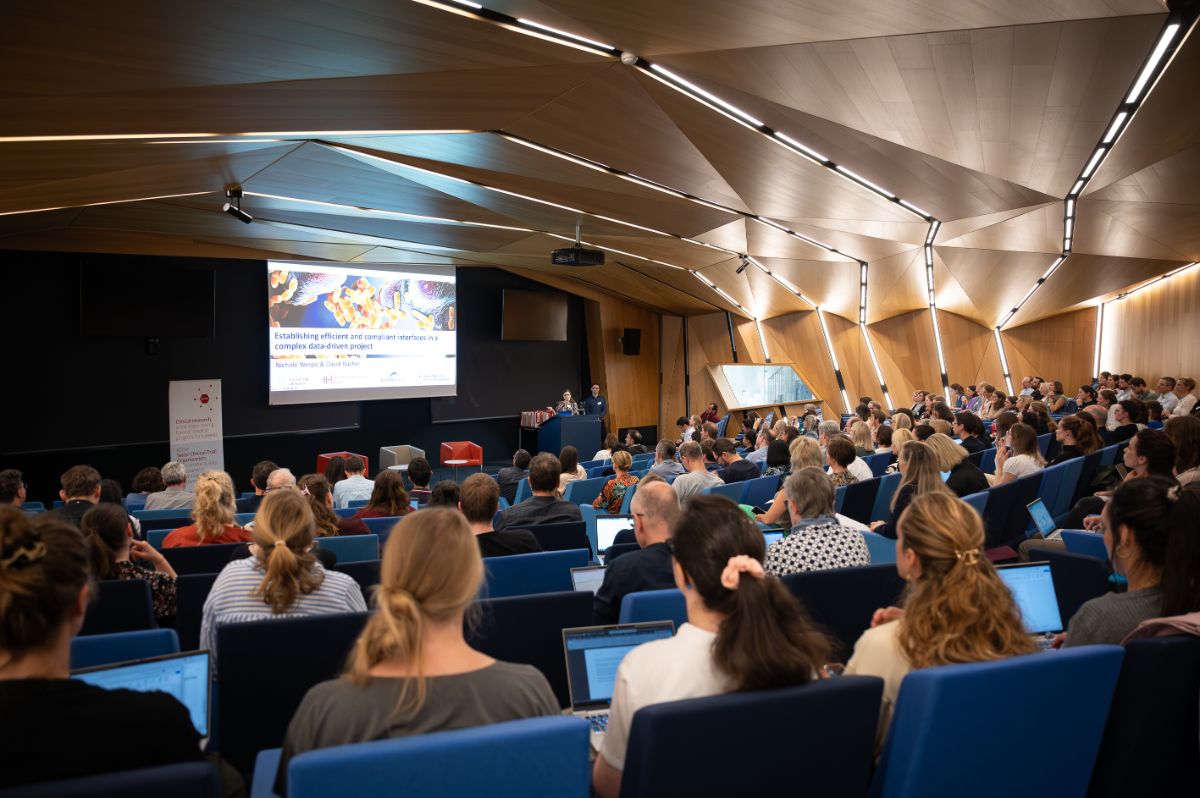Les présentations étaient en anglais.
Accelerating access to data and research collaborations through trusted research environments (TREs)
Dr Jean Louis Raisaro gave an inspiring presentation on the secure virtual collaborative research platform CHORUS developed at CHUV that offers researchers a trusted environment to exchange, share data, and collaborate effectively. Designed with stringent security measures, it ensures the confidentiality and integrity of research findings, enabling seamless teamwork across diverse research teams. By leveraging advanced encryption and authentication protocols, CHORUS platform not only safeguards sensitive information but also promotes innovation and discovery in a secure digital ecosystem. This initiative underscores the commitment to advancing research excellence while prioritizing data security and collaborative synergy.
Establishing efficient and compliant interfaces in a complex data-driven project
Dr Nichole Wespe and Dr David Büchel gave an enlightening presentation that look at the forefront of antibiotic development. They presented how data-driven research is transforming the development of compliant models for discovering next-generation antibiotics. They delved into innovative antimicrobial strategies, highlighting how targeting in vivo pathogen behavior can lead to more effective treatments. The presentation also covered the critical role of clinical data flow and handling in establishing and validating potential antibiotic candidates, ensuring that new therapies are both safe and efficacious.
Pragmatic international clinical trials: lessons learnt from Covid-19
During his inspiring presentation, Prof. Oriol Manuel emphasised that while observational data is valuable, it cannot replace randomized controlled trials for evaluating the effects of interventions. The session highlighted the necessity of large, simplified randomised control trial with broad inclusion and exclusion criteria, leveraging real-world registry data to identify participants and assess outcomes. The importance of centralized, real-time monitoring focused on patient safety rather than traditional on-site tick-box procedures was also discussed. Using the Solidarity and Recovery trials as case studies, he showcased how adaptive designs in academic research played a crucial role in managing the Covid-19 pandemic in real time.
SwissPedHealth: A joint pediatric National Data Stream
Dr. Julia Bielicki presented the SwissPedHealth project consortium, focused on achieving interoperability, harmonisation, and quality control of routine data from children’s hospitals. Utilizing a modular and scalable approach, she outlined the strategy and work packages aimed at integrating Swiss pediatric hubs. Dr. Bielicki emphasized the overarching long-term goal: establishing a learning health system to enhance care quality, facilitate research and trials readiness, inform health policy creation, and support clinical audits.
LUCID, a model of robust clinical data-driven research in Switzerland
Dr. Marie Méan and Jennifer Woods, a patient panel member of the LUCID project, are leading efforts to identify low-value care practices. Their goal is to build indicators and create a registry for efficient study of hospital practices. This initiative aims to combat rising healthcare costs and eliminate wasteful spending. By promoting data-driven benchmarking and targeted quality improvements, they strive to enhance healthcare efficiency and patient outcomes.
Report from the ORD Strategy Council’s Task Force Health and Life Sciences
Prof. Ioannis Xenarios, and Madeleine Hamel presented the Switzerland's Open Research Data (ORD) strategy that serves as a pivotal instrument for coordinating national Education, Research, and Innovation (ERI) actors, particularly within the health and life sciences sectors. The recent ERI report underscores the crucial need for a strategic vision to enhance data interoperability and sharing in healthcare. To tackle the current issues, the strategy proposed to develop standards and reference datasets, especially in biobanking and life sciences, to improve interoperability and support collaborative research. Importantly, the strategy emphasizes patient ownership of health data, advocating for transparency and consent in data usage to uphold ethical standards.













